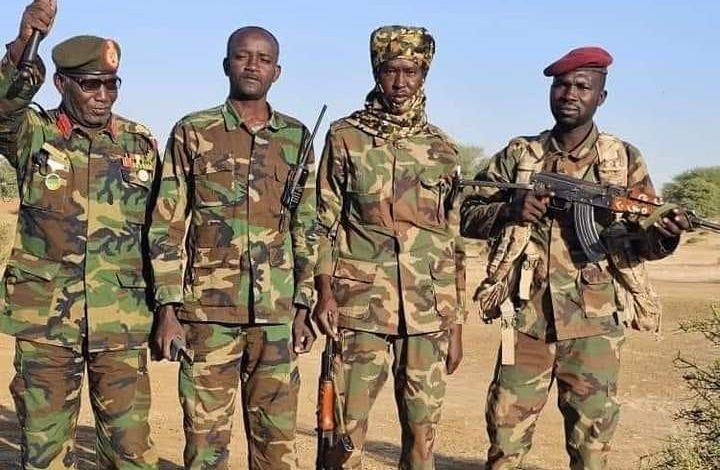Reports
The Joint Forces in Al-Maaqeel Movement, Shendi: “Janjaweed Poison”

Report by: Rehab Abdullah
The “Joint Forces” in the Shendi axis, “Al-Maaqeel Movements,” confirmed the continuation of fighting alongside the Sudanese army against the Rapid Support Forces (RSF). Brigadier General Hussein Abdulrahman, the commander of the Joint Forces in the Shendi axis, Al-Maaqeel movements, gave citizens good news. In a meeting with a group of journalists at the headquarters of the 3rd Infantry Division in Shendi, he stated that the Sudanese Armed Forces have a strategy in all axes, and military matters cannot be disclosed to the media. He assured that in the coming days, the army will overcome many obstacles, with only the final phase remaining, which is also carefully planned by the commanders, adding, “We will be victorious, God willing.”
Rescue of Girls:
On the other hand, Brigadier General Hussein Abdulrahman from the Joint Forces said that the Sudanese Armed Forces had been victorious since the start of the war. He praised General Abdel Fattah al-Burhan, the head of the Sudanese army, for resisting the militia’s attacks himself when more than 100 combat vehicles attacked him. He pointed out that leaders of some countries tried to bribe Burhan with money to leave the country and live abroad, but he sacrificed himself for Sudan and its people.
Brigadier Ali Mukhtar of the Joint Forces affirmed that they have no intention or vision to stop the war against the Janjaweed until the end of time. Meanwhile, Hussein Abdulrahman condemned the violations committed by the RSF, revealing that several girls kidnapped by the militia from Khartoum were rescued after they escaped the RSF and were returned to their families. He questioned the RSF’s motives, asking if they wanted power or revenge against the Sudanese people, criticizing their occupation of citizens’ homes, rape of girls, and looting of property.
Militia Violations:
Hussein stated that he had been among the officers of Khalil Ibrahim’s group that entered Khartoum but was defeated. However, they did not commit the same violations as the RSF. He noted that the leadership and control within the Joint Forces had criticized the behavior of the RSF.
Meanwhile, Brigadier Abbas Muhammad Abdulrahim from the Joint Forces attributed the prominence of the city of El Fasher in the war to its political importance in the ongoing negotiations, especially those in Geneva. He explained that the RSF is trying to establish a political or military presence in El Fasher as it is the only area in Darfur not under their control. He added that they aim to capture El Fasher to facilitate the announcement of their government from there, but this will not happen.
Brigadier Ali Mukhtar downplayed the negotiations and multiple platforms, emphasizing that they cannot lead to peace, noting that Sudan faces threats from foreign powers, especially major countries like the United States and Israel, which pursue their interests. He added that any peace mediated by these powers would not benefit Sudan. The Joint Forces, he said, have experience with such agreements, such as Abuja, which lacked international support for implementation. According to him, civil society is a crisis for Sudan unless there is neutrality and credibility, as many countries with ambitions in Sudan have been behind the outbreak and escalation of the war.
Responding to the People’s Call:
Brigadier Abbas Muhammad Abdulrahim stated that the Joint Forces operate in a coordinated manner with all leaders of the resistance movements and aim to protect both land and honor. They have contributed significantly, particularly in the Darfur and El Fasher axes, by protecting public sites and UN offices and organizations. Additionally, they have safeguarded commercial convoys from the far east to the far west of Sudan. Now, after declaring their withdrawal from neutrality, the Joint Forces are actively involved across all fronts, including Darfur, Al-Qadarif, River Nile, the Northern state, and Khartoum.
Brigadier Ali Mukhtar affirmed that the Joint Forces have joined the fight in response to the Sudanese people’s call. Therefore, all forces are standing behind the armed forces against the aggression and the agendas of hostile states. As Joint Forces and sons of Sudan, they play a national role, standing with the efforts of the armed forces in the defense of the Sudanese state.
Brigadier Hussein Abdulrahman noted that they have been stationed in the River Nile state for nine months and found that the people of the Northern and River Nile states are no different from the rest of Sudan. Initially, they were apprehensive, fearing that the Joint Forces would behave like the RSF. However, after witnessing the discipline and Sudanese values upheld by the Joint Forces, they realized the difference. The forces integrated into society, working with youth and women.
Brigadier Abbas emphasized that El Fasher is the stronghold of the resistance movements, and their enemy is not new, but rather has existed for more than 20 years. He pointed out the national cohesion in North Darfur, highlighting that the region’s resilience had terrified the enemy, prompting retaliatory actions against El Fasher.
In conclusion, Brigadier Ali Mukhtar reiterated that the war against the Janjaweed had been ongoing since the start of the Darfur conflict in 2001 and would continue indefinitely unless the Janjaweed are eradicated from Sudan. He criticized those who advocate for stopping the war, asking if they would leave the country to be ruled by foreigners.



